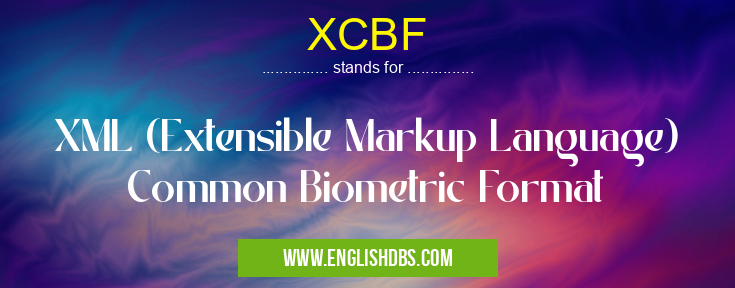What does XCBF mean in US GOVERNMENT
XML (Extensible Markup Language) Common Biometric Format (XCBF) is a core set of specifications developed along with multiple application profiles which rely upon it for the exchange of biometric data across various organizations and technologies. XCBF has been designed to provide a generic means for encoding biometric data in order to facilitate automation, data interchange, and fusion among disparate systems. It provides an efficient architecture for packaging biometrics — such as fingerprints, hand geometry, facial recognition, retinal scans, voice recognition, etc. — along with related attributes like names, addresses, date-of-births or document numbers into one unified structure. This structure is tailored towards both public/national security sectors as well as commercial applications where automation and trust are necessary components within the environment’s design arcitecture.

XCBF meaning in US Government in Governmental
XCBF mostly used in an acronym US Government in Category Governmental that means XML (Extensible Markup Language) Common Biometric Format
Shorthand: XCBF,
Full Form: XML (Extensible Markup Language) Common Biometric Format
For more information of "XML (Extensible Markup Language) Common Biometric Format", see the section below.
Overview
Benefits
The use of XCBF offers numerous advantages over existing standards for encoding biometric data. By virtue of its broad scope across multiple industries and fields including e-commerce, homeland security, law enforcement, healthcare identification and more; XCBF presents an unprecedented level of trust in the quality and accuracy of encoded information transmitted between users/applications regardless if they are implementing different technologies or modalities altogether. This allows integrators who require this level of assurance to confidently deploy more sophisticated systems knowing that they will work seamlessly with other existing networks - even those utilizing less sophisticated methods.
Essential Questions and Answers on XML (Extensible Markup Language) Common Biometric Format in "GOVERNMENTAL»USGOV"
What is XML (Extensible Markup Language) Common Biometric Format?
XML Common Biometric Format (XCBF) is an open standard for exchanging biometric information between systems. It defines the structure of biometric data, which can include physiological or behavioral factors such as facial recognition, fingerprints, voiceprints, and others used to identify an individual. XCBF provides a universal language and ruleset for securely storing and sharing digital biometrics data among different applications.
What type of data can be exchanged using XML Common Biometric Format?
XCBF provides a framework for exchanging digital biometrics of any kind, including physiological or behavioral factors like face recognition, fingerprints, iris scans, voiceprints and other human identifiers. It can also accommodate physiological measurements such as blood pressure or heart rate.
Are there any specific requirements for using XML Common Biometric Format?
Yes. For data interchange based on the XCBF standard to be successful it requires the involvement of all parties concerned in the communication process - both senders and receivers must support the format in order to ensure successful biometric information exchange between two systems. Additionally, systems adhering to this standard should ensure that they are always using secure encryption protocols when exchanging sensitive biometrics information over networks.
What advantages does XML Common Biometric Format provide?
The main advantage of XCBF is its flexibility; it can accommodate different types of biometrics data formats without sacrificing security or interoperability. Additionally, because it is an open standard that does not belong to any specific company or organization, vendors do not have to pay additional fees for access or use of this format in their products and services. Finally, XCBF allows users to store and share large amounts of biometrics data relatively quickly due to its efficiency in encoding large datasets with minimal overhead.
Who developed XML (Extensible Markup Language) Common Biometric Format?
The standard was developed by a consortium of public and private organizations led by NIST (National Institute of Standards and Technology), which serves as the coordinator for the collective effort to create a common format for secure and semantically rich exchange of digital biometrics data between programs written with different programming languages. Members from IBM Corp., Microsoft Inc., Fujitsu Ltd., NEC Corporation also contributed significantly during development stage.
Is there any certification program available for demonstrating compliance with XML Common Biometric Format?
Yes. The Open Certification Program (OCP) was created by NIST as a way for organizations developing software products utilizing this standard to demonstrate conformance with specific versions of XCBF specifications via performance testing conducted by certified laboratories on behalf their product offerings prior to public release. Candidates who successfully pass these tests receive certification marks that signify quality assurance consistent with established industry standards.
What are some potential applications of XML Common Biometric Format?
XML Common Biometric Format has numerous applications in areas such as national security where identity verification is key; healthcare management where medical records need consistent storage; financial institutions where fraud prevention relies heavily on unique authentication systems; e-commerce websites which require customer identification processes; personal devices that need user authentication; social media sites which may need facial recognition system implementation; electronic voting systems with enhanced voter verification procedures; law enforcement agencies requiring criminal databases with accurate facial matching algorithms; and many other environments needing reliable and secure way to store digital identities.
Does the current version supports mobile platforms like iOS & Android?
Yes. Recent update added compatibility support for mobile platforms like iOS & Android devices allowing developers involved in building mobile apps to take advantage from all features available within this particular version.
